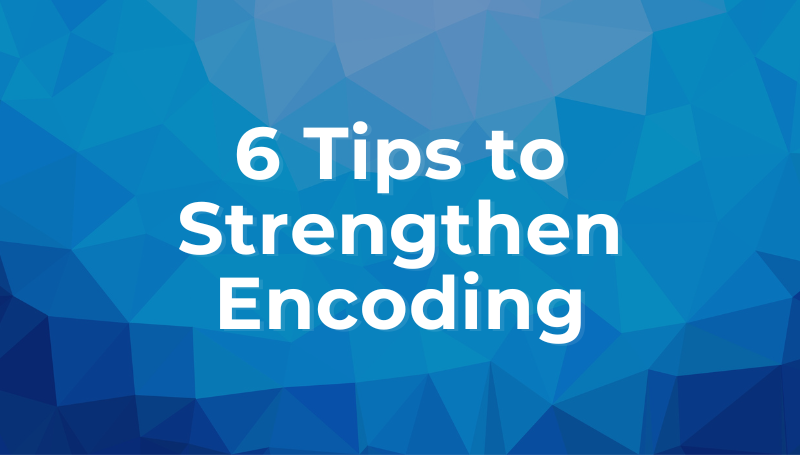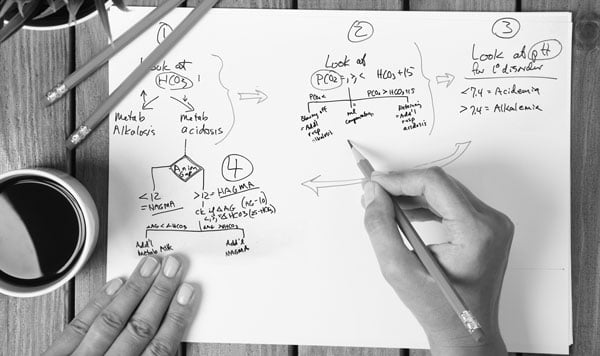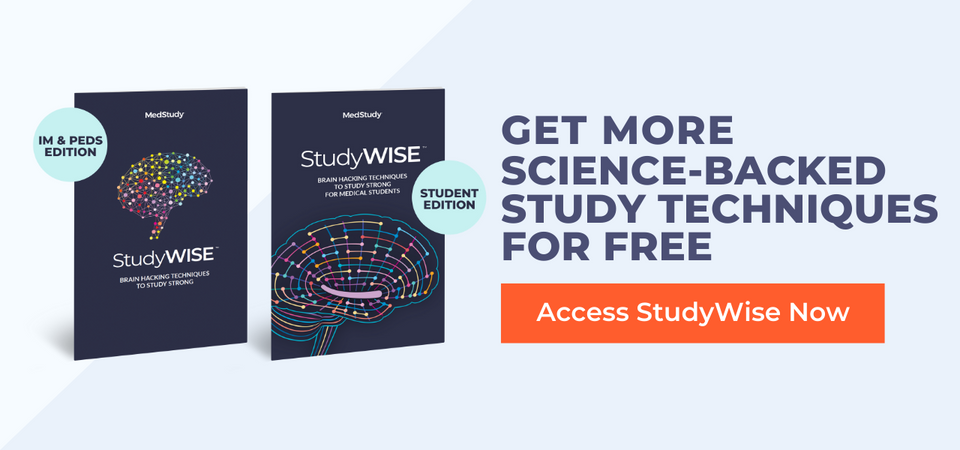
When you experience an event, all the information is funneled to the hippocampus and converted into a neural code that can be stored and accessed, first as working short-term memory and later as distributed long-term memory. This episodic memory contains all relevant information of the event, the “who, what, when, why, and where,” the emotions, the sensations, and the personal importance of the event.
This hippocampal processing is called encoding, and there are a few factors that can influence it.
You may have heard of some of these factors, but study tips like interleaving and varying your surroundings might be new to you. So walk through them with us to make sure you're getting the most out of your study time.
Taken from our StudyWise guide, here are six techniques and behaviors that strengthen encoding and help lock must-know information into your long-term memory.
1. Optimize physical and mental health
Why do we talk about this so much? Because it's important. Remember to take care of your physical and mental health to get the best encoding. Here's how:
- Exercise at least 30 minutes, 5 days a week. As you probably know, exercise decreases stress, anxiety, and depression. Plus, it can improve your sleep. Did you know that regular aerobic exercise not only improves short-term memory but also increases the size of the hippocampus?
- Eat a sensible diet. A balanced diet is always a plus. But it's best to also avoid a diet high in carbs. A high-carb diet adds an increased risk of weight gain, diabetes, and heart disease—and the ups and downs in blood sugar interfere with concentration.
- Sufficient sleep is crucial for decreasing stress and for optimizing the encoding and consolidation processes. Aim for 7–8 hours per night.
- Manage stress. This is a key necessity! Balance your work with relaxation and play. Place mental boundaries around work time, study time, and family time. Don’t let these distinct activities interfere with each other.
- Meditate. Meditation is being studied and, although there is a lot of hype associated with various practices, there are not many sound clinical trials yet. A few good trials on mindfulness meditation, however, do show a benefit for stress reduction and for decreasing anxiety and depression. Regular meditation practice also appears to help with maintaining focus and staying on task.
- Address learning disabilities. Many physicians have previously unrecognized learning disabilities. If you’ve had trouble with calculating, reading, learning, or testing, get a thorough learning disability assessment. A good starting point for more information is the Learning Disabilities Association of America at LDAamerica.org/adults.
Pro Tip: Seriously, get a good night's sleep! When it comes to consolidation and encoding, there is no part of the sleep cycle that’s expendable. How well you “sleep on” what you’ve just learned directly impacts how well you will recall the information later.
2. Develop a strong motivation to learn
In learning, motivation powers your commitment and provides you with the enthusiasm, focus, determination, and persistence to reach your goal. How can you boost motivation and decrease factors that interfere with it? Here are the 4 main influencers:
- Value what you do and why you are taking on this challenge.
- Self-efficacy: Realize that you can do this. Put yourself in a “growth” mindset rather than a “fixed” mindset.
- Solution-oriented behaviors focus on problem-solving and getting things done, rather than attributing your lack of productivity to another person or thing.
- Outlook: Keep a positive outlook. Remember that you are an awesome, future expert doc with amazing grit.
3. Vary your surroundings while studying
Don’t think that because you are in a new environment or because there are a few distractions around that you can’t learn effectively. It’s just the opposite!
Learning research has found that encoding improves when studying in varying surroundings and with mild distractions—surprising and counterintuitive, we know! But, it makes sense when we consider what is prioritized in the encoding of episodic memory.
Episodic memory is event-based. We more strongly encode information that is considered more important, which in turn allows the processing to be very efficient. The importance attached to elements of an event is derived from previous experience and from hard-coded, brain-based processing. The brain tends to attach more importance to differences in our surroundings than to the surroundings themselves. Our brains habituate to elements in our surroundings that don’t change with time and essentially cancel them out. In novel environments, we have much stronger event-related memories. Remember the first time you went to a foreign country, the first time you camped out in the mountains, or the first day of med school? Yes? See, unique experiences stand out!
In novel environments, we have much stronger event-related memories.
On the other hand, studying day-after-day in the same quiet location adds no importance to the memories generated there; it decreases encoding strength because you’re bored to death with the place!
During your study sessions in new, distracting places, focus solely on the study material. You will find that the differences in the environment and the mild distractions are perfectly ignorable. The point of these factors is to enrich the encoding, not to actually distract you!
4. Add interesting stories to your study material
Humans love stories. Stories are a series of events, and our episodic memory mechanisms are most at home cataloging and encoding events.
Here's how to use stories while studying:
1. When doing spaced retrieval practice with Q&As: A board‑style Q&A is already telling a story. It helps with encoding if you put yourself in this story and “experience” the scenario. For example, you can imagine the patient in the question stem is one of your patients or, perhaps, a close relative. If you choose the wrong answer, play out in your mind how this story ends (tragically—with weeping and with friends and colleagues looking out of the corner of their eyes at you), but then, after learning the correct answer, reimagine it with the correct ending (happy—with all friends and colleagues dang proud to know you). Perhaps you then imagine explaining the reasoning of the correct answer to one of your amazed colleagues. Make it an interesting story with an ultimately happy ending.
2. When drawing a concept map: Concept maps are great for breaking down difficult concepts and processes into manageable pieces. These maps show relationships between associated facts that make up the concept and even other concepts. We can think of it as a representation of our semantic network for that concept. Studies show that for concept maps to be effective, they must be generated by you, so copying one off the Internet won't be very useful. Concept maps can look like anything. They are often funny pictures or items with lines drawn between them. Most of the power of the concept map is the thought that goes into creating it. You are clarifying associations and comparing and contrasting similar items.
 Draw a concept map when breaking down difficult concepts and processes into manageable pieces.
Draw a concept map when breaking down difficult concepts and processes into manageable pieces.
5. Put some emotion into your studies
Intense emotion can powerfully enhance encoding, sometimes making an event unforgettable. This can be good, but in the case of mental or physical trauma, it can be debilitating. Though you are probably familiar with using the sheer terror of not passing a test to cram better, we don't recommend making this your go-to study method!
Moderate emotion also enhances encoding, and we can use this effect to enrich the stories we create while studying (as under the previous section “Add interesting stories to your study material”).
Pro Tip: The more personal the emotion you experience with your stories, the better you will encode the event.
6. Interleave the content
Interleaving is combining multiple topics into the same study session. (Personal Trainer uses interleaving when it creates study plans for you!) For example, you can have a Dermatology Preview | Review Question spaced retrieval session combined with an initial reading of topics in A&I and Neurology.
As we like to say, this study technique is pretty dang nonintuitive and may sound a bit crazy. But interleaving has been proven to enhance both the encoding and cognitive processing involved with learning. So stick with it!
Why does interleaving work?
- Practicing recall: Bouncing back and forth between topics can be thought of as mini retrieval practice. The more often you recall knowledge, the better your grasp of it and the stronger your memory of it.
- Increased attention: Once you start studying this way, you will see that you remain fresher and have better focus throughout the study session.
- Active learning: Interleaving is active learning (as opposed to traditional, passive learning) because you are actively engaged in the learning process rather than merely being a passive receptacle. It requires you to constantly think about what you are doing and to direct all your own efforts. This, in turn, helps you maintain focus and deepens your learning.
- Contrast and compare: Mixing concepts forces you to contrast and compare similar information on different topics, thereby building stronger connections between concepts and developing a more robust understanding of each. You don’t get this benefit from studying one topic at a time.
Whew! That's a lot. But we hope this helps you optimize study sessions and strengthen encoding.
Want to dive even deeper into encoding and the MedStudy Method? Read this kickass guide!



